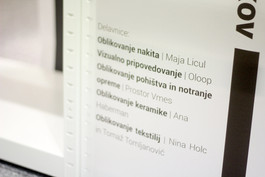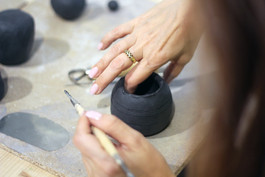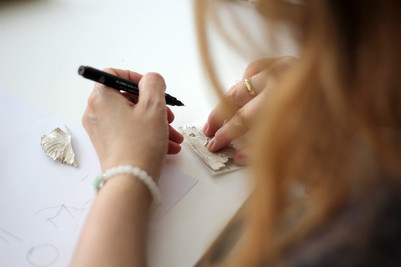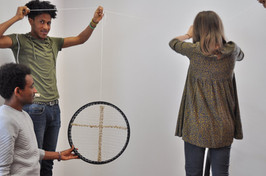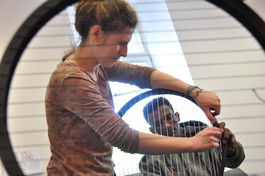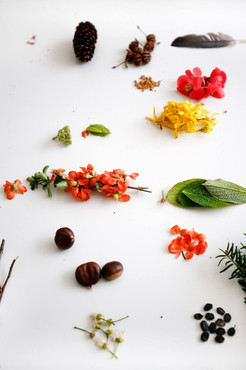


In November 2018, Terra Vera Society started implementing the Akupara project: an incubator for handicrafts, cooperatives and cultural production, which is intended for immigrants and refugees. The operation is co-financed by the Republic of Slovenia and the European Union from the European Social Fund http://www.eu-skladi.si/. By connecting refugees with established Slovenian creators, we will promote methods of co-creation and exchange of skills, which are the result of migrations in the past and present. We will open a space for personal contact between people of different cultures, strengthen awareness of the contribution of immigrants to the development of society and develop competencies for entering the labor market. Among the goals of the project is the development of a cooperative design brand. At least 45 immigrants and refugees will be involved in the project. We will carry out the activities in Maribor in partnership with CAAP, the Nagib association and the Prostor Vmes association, as well as a wider support network.
UNIT 1: TRAINING FOR THE DEVELOPMENT OF HANDICRAFT AND DESIGN PRODUCT PROTOTYPES
Immigrants and refugees bring knowledge, talents and skills to new cultural environments, which, with the right support, can make a great contribution. We will connect immigrants and refugees who came to Slovenia with experience, knowledge, talents, and who have the ambition and desire to work with established craftsmen and designers. Local mentors, with great attention to the traditions of the participants' native cultures, will develop their skills in a way that will be more adapted to the new environment, its poetics and trends, and at the same time, the participants will also strengthen their competences in the field of entering the field of work in our the environment. The participants will draw inspiration for the creation of products from their own stories, which will reflect the real image of migration and thus offer an alternative option to the populist images created by the mass media.
Areas of training:
Unique ceramic design (40 hours)
Textile design (60 hours)
Furniture and interior design (80 hours)
Visual storytelling (40 hours)
Jewelry design (40 hours)
LOT 2: COOPERATIVE
Through a variety of non-formal learning methods, they will get to know fundamental information about cooperatives and learn about the key differences between capital companies and cooperative companies. They will acquire the skills to transform values into elements of a business model/cooperative, with an emphasis on intercultural dialogue and the context of values in diverse environments. Based on the detection and analysis of their own values, the participants will acquire basic knowledge and skills in the field of cooperatives. At the same time, they will develop a concrete new cooperative, where they will participate in the development of a socially innovative product and the establishment of a new cooperative in a guided environment.
The module on cooperatives will include:
• Basic knowledge (12 hours)
• Simulation of the development of a new cooperative (16 hours)
• Establishing social economies within capitalism (12 hours)
• Digital fabrication (8 hours)
• Practical training in existing cooperatives (12 hours)
The module consists of 60 hours.
LOT 3: CULTURAL PRODUCTION
Through training in the field of cultural production, participants will become aware that handicrafts are not just aesthetic objects, but are an expressive medium for transmitting messages, with the help of which immigrants and refugees can shape and articulate their own stories (and stories of encounters), thereby co-creating and control their own media and public image. Familiarity with local cultural heritage during visits to cultural institutions and while working with independent creators in the field of culture will serve as inspiration for the creation of products and the way in which immigrants and refugees place themselves in a new environment, appropriating space and local cultural traditions, while at the same time they look from a different, new perspective and express this specific view in their own creations. One of the results of this set will be the installation 'Living Room II', a conceptual exhibition installation that will attract diverse audiences and establish itself as a space for creative encounters between immigrants, refugees and local designers, artisans._cc781905-5cde -3194-bb3b-136bad5cf58d_
The module consists of 60 hours.
FULL PROJECT TITLE
NEW ROOTS - Migrantour intercultural walks building bridges for newcomers active participation
COORDINATOR
Terra Vera Society
PARTNERS
NEW ROOTS - Migrantour intercultural walks building bridges for newcomers active participation
TIMELINE
January 2018 - December 2019
PROGRAM/ SUPPORT
Ministry of Culture
21
PARTICIPANTS
7
DAYS
7
THE COUNTRY
12
WORKSHOPS







